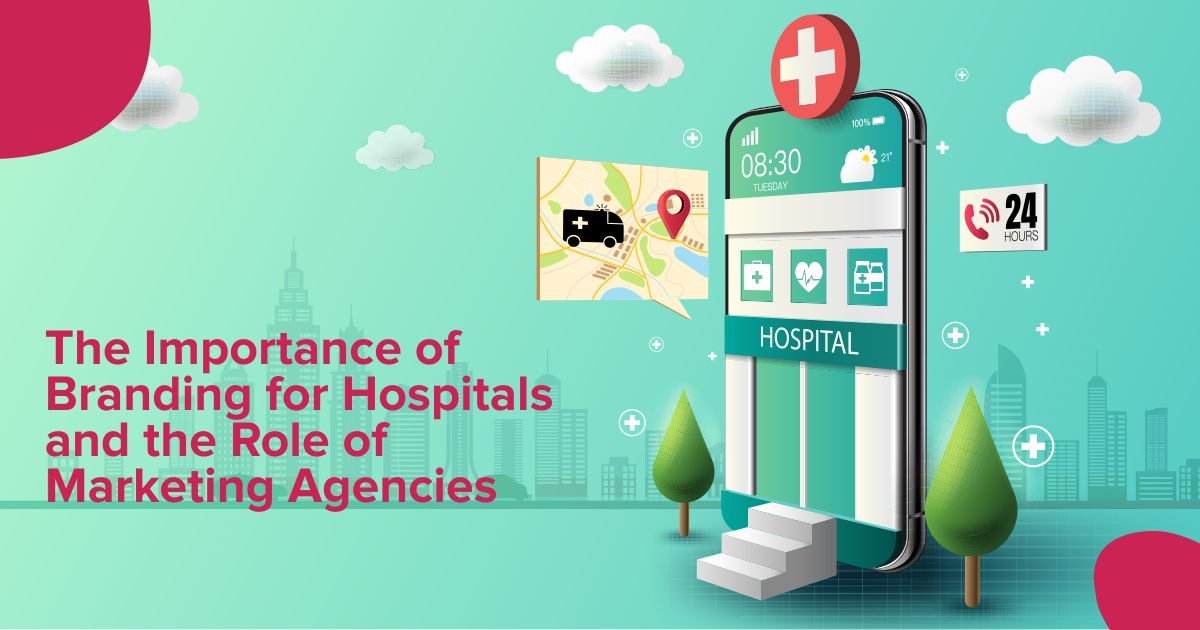
The Importance of Branding for Hospitals and the Role of Marketing Agencies
What is Healthcare Branding?
The technique of influencing how a healthcare institution is regarded is known as healthcare branding. After all, perceptions are what brands are. Your organization’s brand is how people interact with it and judge it. That includes your physicians, nurses, and board members, but most importantly, it also includes your patients.
Healthcare branding enables firms to control how they are viewed. Every hospital represents a specific brand value, whether it is affordable healthcare or specialized services. Effective communication of the organization’s mission is crucial for everyone on staff, from the CEO to the volunteer at the front desk. The end result is a company that follows its brand.
As dependable, considerate, informed, skilled, etc, your healthcare company’s brand is more than just a name, tagline, logo, or messaging; it’s the recognizable emotion that these components arouse. A positive hospital brand image encourages patient loyalty directly and also improves customer satisfaction by providing higher quality services, which encourages patients’ intentions to return.
Hospitals should therefore concentrate their marketing efforts on effective and strategic brand management in the highly competitive healthcare sector. A brand is the customer’s perception of a product, service, experience, or organization, according to one definition.
Purpose of Branding
The purpose of branding is to create a consistent perception of what a firm stands for and believes in. Branding requires a significant investment, but the reward is enormous. Differential equity is created by strong brands.
Brands facilitate business since a company is recognized by the brand name that it carries. With so many services on the market and customers who are well informed, the commodity must be branded in order to leave an impact on the consumer’s mind.
As a result, if the business wants to be seen, differentiated, and viewed as more than just another organization providing the same services as others, it must always brand the service.
Advantages of Hospital Branding
Aids in the Acquisition of New Patients
Obtaining new patients is the ultimate goal of every hospital. Hospital marketing assists you in gaining new patients by increasing your hospital’s brand awareness and visibility in the internet environment and putting you directly in front of your target audience.
Effective hospital branding aids in the acquisition of new patients by building trust, credibility, and differentiation, making the hospital a preferred choice for individuals seeking quality healthcare services.
Patient Engagement and Loyalty
Patient engagement and loyalty are heavily influenced by branding. A hospital with a good brand can establish a long-term emotional connection with its patients, resulting in enhanced loyalty.
Patients are more inclined to return to a hospital with which they trust and connect, and they are also more likely to suggest it to others.
Differentiation from Competitors:
In an increasingly competitive healthcare sector, hospitals must discover ways to differentiate themselves. Hospitals can use branding to distinguish themselves from their competition.
A distinct and engaging brand identity assists the hospital in carving out a market niche, making it easier for patients to remember and select it when the need comes.
Role of Marketing Agencies for Branding of Hospitals
Developing and nurturing a good hospital brand involves a strategic approach as well as marketing expertise.
This is where marketing firms may help. Let’s look at how important they are in hospital branding:
Healthcare Marketing Expertise
Marketing firms that specialize in healthcare understand the industry’s particular difficulties and prospects. They are well versed in healthcare trends, patient behavior, and industry laws.
This knowledge enables them to create effective branding strategies that are suited to the hospital’s aims and target audience.
Targeted Branding Strategies
The foundation of a successful hospital brand is a thorough grasp of the target audience. To define the hospital’s target audience, marketing agencies do extensive market research and use data driven tactics.
With this insight, they develop branding strategies that effectively target the audience’s pain areas and wants.
Enhances brand visibility in search engines
Hospital marketing may be incredibly cost effective, allowing you to engage with the right audience at the right time and place for a fraction of the price of traditional advertising.
For example, by optimizing your website for search engines, you can now significantly increase the visibility of your practice. You may rank for relevant healthcare related search terms and get more people to your website by focusing on organic SEO tactics.
Multi Channel Marketing Approach
To reach a larger audience, hospital branding necessitates a multi-channel marketing approach. To promote the hospital’s brand, marketing agencies use a combination of online and physical platforms.
This covers social media marketing, SEO, content marketing, print materials, and other services. A well planned and integrated marketing campaign ensures that brand messaging is consistent across all platforms.
Brand Identity Development
Marketing firms are critical in building a hospital’s brand identity. From creating a visually appealing logo to building an engaging brand story, agencies ensure that the hospital’s brand communicates the proper message to its target audience.
They also develop brand standards that govern the use of brand aspects in all marketing communications.
Reputation control
It’s crucial for hospitals to keep a good name. Marketing firms actively maintain the hospital’s reputation and internet presence.
They interact with the public, reply to patient reviews, and take swift action on any unfavorable comments. Building a solid brand reputation is facilitated by effective online reputation management.
Conclusion
At Bhaav, a distinguished Healthcare Branding Agency, the team meticulously crafts compelling brand narratives and implementing targeted marketing strategies,
We empower hospitals to cultivate credibility, connect with patients, and excel in a dynamic healthcare arena. The agency’s adept guidance illuminates the pivotal role of Marketing Agencies in fortifying a hospital’s image, fostering patient loyalty, and driving community engagement.
Bhaav™ exemplifies the profound impact that strategic branding, facilitated by adept marketing agencies, can have on hospital’s enduring success, ensuring they thrive as beacons of trust, compassion, and excellence.
FAQ’s
1.Why is hospital branding important?
Branding establishes a distinct brand, fostering patient trust and recognition. It influences patient decisions by communicating values, quality, and expertise.
2. How does branding influence the patient experience?
Effective branding creates a favorable perception, increasing patient trust and loyalty. It promotes a sense of belonging and ensures continuous service.
3. What is the function of marketing agencies in hospital branding?
Marketing firms provide strategic campaigns that shape hospital views, reach a broader audience, and demonstrate healthcare knowledge.
4. Is branding limited to logos and designs?
No, branding entails more than just graphics. It covers the hospital’s beliefs, mission, patient interactions, and overall experience.
5. How does hospital branding affect competitiveness?
Effective branding distinguishes hospitals by establishing them as preferred alternatives in the face of competition, favorably increasing patient volume and satisfaction.
6. How can branding assist in crisis management?
Yes, good branding may help to protect a company’s reputation during a crisis since existing trust helps with crisis management and recovery.
7. How do marketing firms assess branding success?
To assess branding performance, marketing companies monitor variables such as patient feedback, brand awareness, internet engagement, and patient retention.
